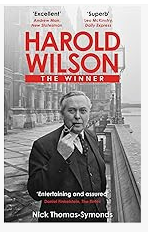It’s outside my usual territory but I enjoyed reading Harold Wilson: The Winner by Nick Thomas-Symonds. It’s an unashamedly positive biography of a Prime Minister of my childhood and teenage years, when my main awareness of him was the rather affectionate mimicry by comedian Mike Yarwood. One of the book’s key arguments is that Wilson deserves credit for keeping Britain out of the Vietnam War without falling out too badly with President Johnson.
The economics was more interesting to me. Wilson was an economist who had started out (before the 2nd World War took him into public service and then politics) as an Oxford don. So by academic measures he was a very good economist. Yet he’s associated with the devaluation of sterling and the UK’s postwar balance of payments problems and relative economic decline. On the other hand, he was an advocate of research and innovation (the ‘white heat of technological revolution’ speech), created a separate (from the Treasury) Department of Economic Affairs – as many advocate now – and was a pragmatic nationaliser and believer in active industrial policy (ditto). He thought as much about the supply side as demand management.
Any of the PMs of the pre-2010 past look like titans compared to their more recent successors. What’s also striking is the general calibre of their cabinets and advisors. Wilson had politicians like Denis Healey, Jim Callaghan, Barbara Castle, Richard Crossman and Tony Benn around him, substantial people with much experience outside parliament, intellectual depth, and cultural hinterlands. I wonder what the Wilson Cabinet elected in October 1964 would make of 2024?

